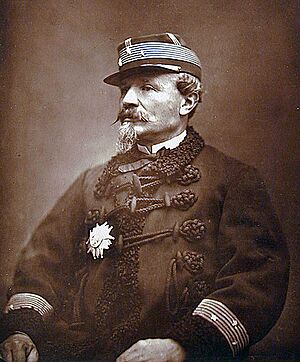Antoine Chanzy facts for kids
Quick facts for kids
Alfred Chanzy
|
|
|---|---|

Antoine Alfred Eugène Chanzy
|
|
| Born | 18 March 1823 Nouart, France |
| Died | 4 January 1883 (aged 59) Châlons-en-Champagne, France |
| Allegiance | |
| Service/ |
French Army |
| Years of service | 1843–1883 |
| Rank | Général de Division |
| Commands held | XVI Corps VII Corps XIX Corps |
| Battles/wars | Franco-Austrian War Franco-Prussian War |
| Awards | Grand Cross of the Légion d'honneur Médaille militaire |
Antoine Eugène Alfred Chanzy (born March 18, 1823 – died January 4, 1883) was a famous French general. He was known for his victories during the Franco-Prussian War. He also served as a governor in Algeria.
Contents
Antoine Chanzy's Life and Military Career
Early Life and Training
Antoine Chanzy was born in Nouart, France, in 1823. His father was a cavalry officer, which means he was a soldier who rode horses in battle. Chanzy first studied at a naval school in Brest. However, he decided to join the artillery, which uses large guns.
Later, he attended the important military academy called Saint-Cyr. In 1843, he became an officer in a special infantry unit called the Zouaves.
Service in Algeria and Italy
Chanzy spent a lot of time fighting in Algeria. He was promoted to lieutenant in 1848 and then to captain in 1851. By 1856, he became a chef de bataillon, which is a commander of a battalion (a military unit).
He also fought in the Second Italian War of Independence. He was part of important battles like Magenta and Solferino. Later, he served in a campaign in Syria as a lieutenant-colonel. In 1864, he commanded the 45th Regiment in Rome as a colonel. He returned to Algeria as a general and helped stop an uprising there.
The Franco-Prussian War
When the war with Prussia began, Chanzy was not immediately given a command. This was because some people in the war office didn't like him. However, after a big change in the French government, he was called back from Algeria. He was made a general of division and given command of the XVI Corps. This unit was part of the Army of the Loire.
Victories with the Army of the Loire
Chanzy's corps played a key role in some of France's biggest successes during the war. They won a battle at Coulmiers. They also had another victory at Patay. In both these fights, General Chanzy's soldiers performed very well.
After a major battle at Orléans, the French army split. Chanzy was then put in charge of the western part, which was called the Second Army of the Loire. Even his enemies, like Prince Frederick Charles, saw Chanzy as a very strong opponent.
Retreat and Defeat
Chanzy showed great courage and skill during the fighting from the Battle of Beaugency to the Loire River. However, his army was made up of soldiers who were not well-trained or well-equipped. They suffered a big defeat at the Battle of Le Mans in January 1871.
After this loss, Chanzy managed to lead his remaining forces back to Laval. But his army had lost many soldiers.
After the War
Chanzy was recognized for his service and was made a grand officer of the Legion of Honour. He was also elected to the National Assembly, which is like a parliament.
When the Commune rebellion started in Paris, Chanzy was captured by the rebels. They made him promise not to fight against them. Some people believed he would have been chosen to lead the army against the Commune if he hadn't been captured. The government even paid a large sum of money to get him released.
Later Career and Legacy
In 1872, Chanzy became part of the defense committee. He also commanded the VII Corps. In 1873, he was appointed governor of Algeria. He stayed in this important role for six years.
In 1875, he became a life senator. In 1878, he received the highest honor, the Grand Cross of the Legion of Honour. In 1879, he was even nominated to become president of France, receiving a good number of votes.
From 1879 to 1882, Chanzy served as the French ambassador to Russia. He was highly respected there, and even the German Emperor William I and Prince Bismarck showed him respect.
Chanzy died suddenly in 1883, while commanding the VI Corps near the German border. He received a state funeral, which is a special funeral paid for by the government.
Chanzy wrote a book called La Deuxième Armée de la Loire (The Second Army of the Loire). Statues honoring General Chanzy have been built in Nouart and Le Mans. He was also mentioned in a famous book by Anatole France called The Wicker Work Woman.
 | Anna J. Cooper |
 | Mary McLeod Bethune |
 | Lillie Mae Bradford |

